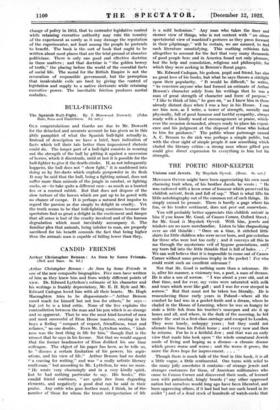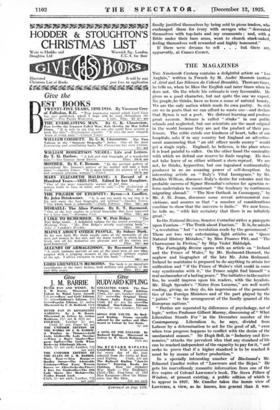THE POETIC SHOP-KEEPER
Visions and Jewels. By Moysheh Oyved. (Berm. 6s. net.) MOYSITER OYVED might have been appreciating his own most charming trait when, of his brother Jacob, he wrote : " He was endowed with a keen sense of humour which preserved his -childish naivete, fresh and full of sap." That is what-lifts his little autobiography out of the common rut of such things. He simply cannot be prosaic. There is hardly a page where his fun, or his tender sentiment, does not peer out somewhere.
You will probably better appreciate this childish naivete in Lim if you know Mr. Good, of Cameo Corner, Oxford Street ; for Mr. Good is Moysheh Oyved. With him, jewels and trinkets are no mere merchandise. Listen to him rhapsodising over an old thimble : Once on a time, it stitched little shirts for little children who were never born, and graveclothes for those who were lost too early ; and it conveys all this to me through the mysterious veil of bygone generations, until my tears fall into the little thimble that is full of holes. . . ." We can well believe that it is impossible to come out of Cameo Corner without some precious trophy in the pocket ! For who could resist such an excellent salesman ?
Not that Mr. Good is nothing more than a salesman. He is, after his manner, a visionary too, a poet, a man of dreams. He is also a son of sorrow. I was about a year old, and at that time, and for ever, my veins were saturated with milk and tears which were like gall ; and I was for ever steeped in sorrow." But that must not be taken too literally. He is remembering those early years in Poland—where all the comfort he had was in a pocket-knife and a dream, where he chafed in the House of Learning, where he was so hungry he stole a little fish from his teacher's saucepan and ate it up bones and all, and where, in the dark of the morning, he hid under the seat in a first-class carriage and escaped to London, They were lonely, unhappy years ; but they could not alienate him from his Polish home ; and every now and then he returns. For he is a faithful Jew ; and that was an early view that made him look upon "the whole unnatural Jewish mode of living and hoping as a disease—a chronic disease which grows worse and worse ; and the worse it grows, the more the Jews hope for improvement. . . . '
Though there is much talk of the Soul in this book, it is all a little vague, a little sentimental. One turns with relief to the many jolly anecdotes it contains—of strange jewels and stranger customers for them, of American millionaires who came to Cameo Corner and discovered their- souls, of learned men with patriarchal, kingly beards (" any other oppressed nation but ourselves would long ago have been liberated, and been oppressing others, if it had had but one such beard in its midst ") and of a dead stock of hundreds of watch-cocks that finally justified themselves by being sold to pious traders, who exchanged them for ivory with savages who " decorated themselves with top-hats and my ornaments ; and, with a Bible under their bare arms, went to church stark-naked, feeling themselves well rewarded and highly honoured."
If there were dreams to sell . , but there are, apparently, at Cameo Corner.























































 Previous page
Previous page